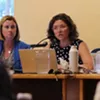Burlington city councilors on Wednesday unanimously approved a $107.1 million budget for fiscal year 2026 that shrinks the size of city government while still investing in public safety and the local economy.
The spending plan uses a mix of cuts and tax increases to close a $9.8 million budget gap, the second multimillion budget hole that Mayor Emma Mulvaney-Stanak has contended with in her short tenure. Balancing the budget required laying off 18 staffers and cutting seven vacant positions in what was the first major shrinkage of the city workforce in more than a decade.
Even so, the budget earmarks funds for public safety and social services — a necessity as the Queen City deals with a drug and homelessness crisis. Eight more police officers could be hired with this budget, and the Howard Center’s Street Outreach Team, which responds to calls involving mental illness and drug use, will receive a historic $249,000 allotment, up from $77,500.
Democratic councilors also negotiated more support for businesses, including a potential program to pay those affected by the disruptive construction on Main Street.
“I hope people will see this budget ideally as a budget that is fair, and a fair compromise between the city council and my administration that can deliver the core services to residents in an affordable way,” Mulvaney-Stanak said.
Burlington’s Money Woes Are Forcing Difficult Decisions

Burlington’s Money Woes Are Forcing Difficult Decisions
By Courtney Lamdin
City
The $0.8556 tax rate, a 2 percent increase over the current year, will add about $115 to the tax bill for a home valued at $500,000. When figuring in education taxes, however, that same homeowner is projected to see an overall tax decrease in fiscal year 2026, which begins on July 1.
The budget was Mulvaney-Stanak’s first go at her “ModernGov” initiative, a yearslong effort to cut costs, including by trimming staff. The budgeted city workforce has grown by nearly 100 positions over the past decade, 37 of them paid for with one-time funds such as federal coronavirus money that is all but gone. The city hasn’t brought in enough money to cover increasing costs.
Mulvaney-Stanak’s plan anticipates nearly $4 million in new revenue, with a chunk of that raised by upping taxes for parks, highways and public safety — all levies that make up the municipal tax rate. About $1 million of that total will be raised by stepping up enforcement of code violations and by collecting gross receipts taxes on hotel rooms that are expected to open at Burlington Square (formerly CityPlace) this summer, among other sources.
ModernGov found $2 million in savings, including by merging the Community & Economic Development Office with the Business & Workforce Development department. A new Department of Finance & Administration will combine human resources, information technology and both the assessor and clerk/treasurer’s offices.
More savings came from cutting programs such as CORE, which serves seniors at the Old North End Community Center, and adult programming through Burlington City Arts. Neither BCA nor the city’s office of Racial Equity, Inclusion & Belonging will offer city budget-funded grants next year.
Burlington’s Main Street Will Reopen for Two-Way Traffic on Nights, Weekends

Burlington’s Main Street Will Reopen for Two-Way Traffic on Nights, Weekends
By Courtney Lamdin
News
Negotiations with council Democrats resulted in a few changes to the mayor’s proposal. They include $130,000 for BCA to stage more events downtown and $45,000 to expand free parking in the Marketplace Garage. The city will also look into offering grants or loans to businesses affected by the downtown construction, which is slated to run through late 2026. There’s no dollar amount attached, but the council’s budget resolution commits to “make all reasonable efforts” to fund such a program. CEDO will present a proposal in October.
The budget also maintains funding for the fire department’s overdose response team, the city’s special assistant to end homelessness and the mayor’s senior adviser on community safety. A housing adviser, the only new position in the budget, will come on board late in the fiscal year. Mulvaney-Stanak, meantime, has opted not to take a raise, and department heads will wait six months to get their annual cost of living increase.
At Wednesday’s special meeting, councilors largely expressed appreciation for the administration’s work. But some Democrats lamented that Mulvaney-Stanak kept councilors out of the loop for too long as she crafted her proposal. More eyes on the budget would have caught errors sooner, Council President Ben Traverse (D-Ward 5) said, such as a $1.8 million accounting snafu that officials revealed earlier this month.
Burlington Discovers $1.8 Million Budgeting Error

Burlington Discovers $1.8 Million Budgeting Error
By Courtney Lamdin
News
“While I still have some reservations around this budget and on the process that led up to it, I do think that the recent days and weeks have been a real model of collaborating in good faith efforts,” Traverse said at the Board of Finance meeting that preceded the council discussion. “I do think this is a budget that ultimately reflects the priorities of this city.”
Councilors also attempted to make two last-minute adjustments to the budget. Councilor Carter Neubieser (P-Ward 1) moved to cut a $100,000 donation to the University of Vermont Medical Center’s Home Health and Hospice program, charging that the health network has the money to pay for it. Councilor Evan Litwin (D-Ward 7) moved to transfer $7,500 of the Street Outreach money to the Turning Point Center, arguing that recovery programs are equally important to those focused on harm reduction.
Their colleagues rejected those efforts, saying it was too late in the process to make substantial changes.
